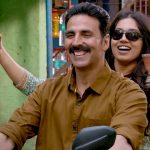Imtiaz Ali’s films are synonymous with good music. Not all his films have hit the bull’s eye at the box-office but the music, or at least a couple of songs, always make it to the popularity charts and remain entrenched in the listeners’ mind for a very long time. Be it Sandesh Shandilya’s underrated score for ‘Socha Na Tha’, Pritam’s mass appealing songs for ‘Jab We Met’ or ‘Rockstar’, which, arguably, is one of the best albums put together by A.R Rahman, the music of his films always gives one a reason to cheer about. Though Ali collaborated with Rahman on his last three films (‘Rockstar’, ‘Highway’ and ‘Tamasha’), he joins hands with Pritam for this Shah Rukh Khan – Anushka Sharma starrer ‘Jab Harry Met Sejal’. Pritam had scored some really popular music for ‘Jab We Met’ and ‘Love Aaj Kal’, Ali’s biggest successes as a director.
While Harvinder/Harry (Shah Rukh Khan) starts singing a folksy Punjabi number he used to sing back in his village in Punjab, Sejal (Anushka Sharma) hums a modern-devotional song she sings in front of her Gujarati relatives in family gatherings. The amalgamation of these two distinct sensibilities result in “Radha”. The contrasting voices of Shahid Mallya and Sunidhi Chauhan add to the fun. The arrangements, too, are a great mix of EDM and traditional sounds. The song is mellifluous and upbeat in equal measures.
Pritam whips up a funky 80s disco sound in “Beech Beech Mein” while making sure that it sounds voguish. The main verse catches your attention in a while and just when you have got used to it, the retro vibe takes a hike in the second verse which sounds different from the first. In fact, you cannot help but imagine a Hindi film hero from the 70s lip-syncing to the lines in the second verse. The song grows on you with every listening.
A pleasantly nonchalant acoustic guitar piece sets the stage for Arijit Singh to sing “Safar”, a moody, dreamy and instantly likeable track that the singer sings in a suitable laidback manner. The vocal, tune, arrangements and the lyrics come together wonderfully to acquaint us with Harry, a tourist guide who wanders around with his tourists and does not really have a home. This is a song you would like to play on a loop while travelling.
“Butterfly” is perhaps one of the very few songs in the album that adheres to a template – one of those songs which are considered to be formulaic or safe. But, that is not always a bad thing. The song, which plays in the closing credits and aims to serve as an accompaniment to the ‘happy ending’ of the film, is extremely catchy and carries a distinct flavour that one associates with celebration songs in Punjab. Irshad Kamil gives Jyoti and Sultana Nooran a few lines in Punjabi and Urdu to sum up the Rumi quote ‘what you seek is seeking you’ that is seen on the posters of the film.
In the last decade, composers like A.R Rahman, Vishal-Shekhar and Pritam have composed several romantic songs for Shah Rukh Khan that he can sing and serenade the heroine with. While a couple of them have been good, none of them could the timelessness of a “Tujhe Dekha To” (‘Dilwale Dulhaniya Le Jayenge’) or the brilliance of a “Tere Liye” (‘Veer-Zaara’). With “Hawayein”, Pritam gives Khan and his fans a song that they are likely to remember for a long time. This Arijit Singh song number has the same magic that a lot of songs composed by the likes of Jatin-Lalit had in the 90s and the early millennium.
A pathos filled composition moulded in the form of a traditional Punjabi song and backed by electric guitars and drums played in a Coke Studio-like style, that sums up “Parinda”. Both the tune and the arrangements have a raw and pleasantly crude quality to them which makes the track very interesting. Pardeep Saran and Tochi Raina do complete justice to the song in their respective versions. Nikhil D’Souza chips in with some English lines in the film version.
A sense of melancholia creeps in your heart as you hear the bitter-sweet melody called “Ghar”. While the Coldplay-inspired sound is evident in the track, it, for some reason, reminds us of the musical sensibilities of A.R Rahman and Sandesh Shandilya, the other two composers Imtiaz has worked with. Perhaps, it is the haunting and sonorous texture of the track that make us feel that. Nikitha Gandhi’s icy chilled voice and Mohit’s Chauhan’s moony voice work fantastically for this sombre and dreamy song which, also, is the best track on the album.
Pritam shapes up “Yaadon Mein” like a true blue Spanish/Latin American melody but makes sure that it does not sound like something that would alienate the average Hindi film music listener. Jonita Gandhi, who has lent her voice to a variety of songs of different genres in the last two years, proves her versatility yet again by doing complete justice to this track. Mohammed Irfan, too, lends good support. Cuca Roseta sings a couple of lines in Spanish which adds to the authenticity of the piece.
Though “Raula” is a celebration song along the same lines as “Butterfly”, it does not sound as ‘templatized’ as the latter. As is the case with most of the songs he sings, Diljit Dosanjh adds that extra spark to this track as well. Irshad Kamil’s lyrics and the underlying emotional undercurrent lends a nice thehrav to the song. In the latter part of the song (at 2:52 minutes, to be precise) the emotional quotient goes a little higher as Neeti Mohan sings a few lines that reflect the emotions Sejal (Anushka) is going through at that moment.
What one thought to be the opening lines (sung by Jyoti and Sultana Nooran) in “Butterfly” are actually a part of a full-fledged song that has a completely different mood and a very distinct flavour from that of the dance number. “Jee Ve Sohneya”, also sung by Jyoti and Sultana Nooran, sounds like a very well-balanced mix between a folk-inspired song and a devotional number. In contrast, the arrangements have a mix of electronic sounds and pads which give the song a good texture.
“Phurrr”, composed by Pritam and produced by American musician Diplo, might be a promotional soundtrack but if you pay attention to the lyrics carefully, you will realize the song is entrenched in the narrative structure of the film. The track is a heady concoction of EDM based arrangements, effective rendition by Mohit Chauhan and Tushar Joshi and a hummable tune by Pritam lying underneath the massive production/orchestral structure.
One thought the film had five songs and a promotional track (“Phurrr”) but on Thursday night, a couple of hours before the film was to hit the screens, the entire album consisting of as many as thirteen tracks came out. It turned to be a very pleasant experience as the soundtrack, as a whole, sounded fantastic. However, the fact remains that half of the songs in the album have not been promoted and with the film failing at the box-office, there is a chance that some of them might never get their due from the listeners. Pritam has evolved greatly as a composer in the last couple of years showing his range as a composer with different kinds of films. After hearing this mammoth thirteen track album, one can confidently say that ‘Jab Harry Met Sejal’ is his best work as a composer till date.
Rating: 4.5/5

